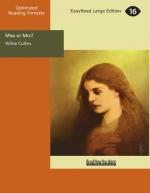The guilty mind of Turlington was far from feeling satisfied with the meager description of the stranger thus rendered. He could not be engaged in surveying in the dark. What could he want in the desolate neighborhood of the house and church-yard at that time of night?
The man wanted—what the man found a little lower down the lane, hidden in a dismantled part of the church-yard wall—a letter from a young lady. Read by the light of the pocket-lantern which he carried with him, the letter first congratulated this person on the complete success of his disguise—and then promised that the writer would be ready at her bedroom window for flight the next morning, before the house was astir. The signature was “Natalie,” and the person addressed was “Dearest Launce.”
In the meanwhile, Turlington barred the window shutters of the room, and looked at his watch. It wanted only a quarter to nine o’clock. He took his dog-whistle from the chimney-piece, and turned his steps at once in the direction of the drawing-room, in which his guests were passing the evening.
TWELFTH SCENE.
Inside the House.
The scene in the drawing-room represented the ideal of domestic comfort. The fire of wood and coal mixed burned brightly; the lamps shed a soft glow of light; the solid shutters and the thick red curtains kept the cold night air on the outer side of two long windows, which opened on the back garden. Snug arm-chairs were placed in every part of the room. In one of them Sir Joseph reclined, fast asleep; in another, Miss Lavinia sat knitting; a third chair, apart from the rest, near a round table in one corner of the room, was occupied by Natalie. Her head was resting on her hand, an unread book lay open on her lap. She looked pale and harassed; anxiety and suspense had worn her down to the shadow of her former self. On entering the room, Turlington purposely closed the door with a bang. Natalie started. Miss Lavinia looked up reproachfully. The object was achieved—Sir Joseph was roused from his sleep.
“If you are going to the vicar’s to-night. Graybrooke,” said Turlington, “it’s time you were off, isn’t it?”
Sir Joseph rubbed his eyes, and looked at the clock on the mantel-piece. “Yes, yes, Richard,” he answered, drowsily, “I suppose I must go. Where is my hat?”
His sister and his daughter both joined in trying to persuade him to send an excuse instead of groping his way to the vicarage in the dark. Sir Joseph hesitated, as usual. He and the vicar had run up a sudden friendship, on the strength of their common enthusiasm for the old-fashioned game of backgammon. Victorious over his opponent on the previous evening at Turlington’s house, Sir Joseph had promised to pass that evening at the vicarage, and give the vicar his revenge. Observing his indecision, Turlington cunningly irritated him by affecting to




